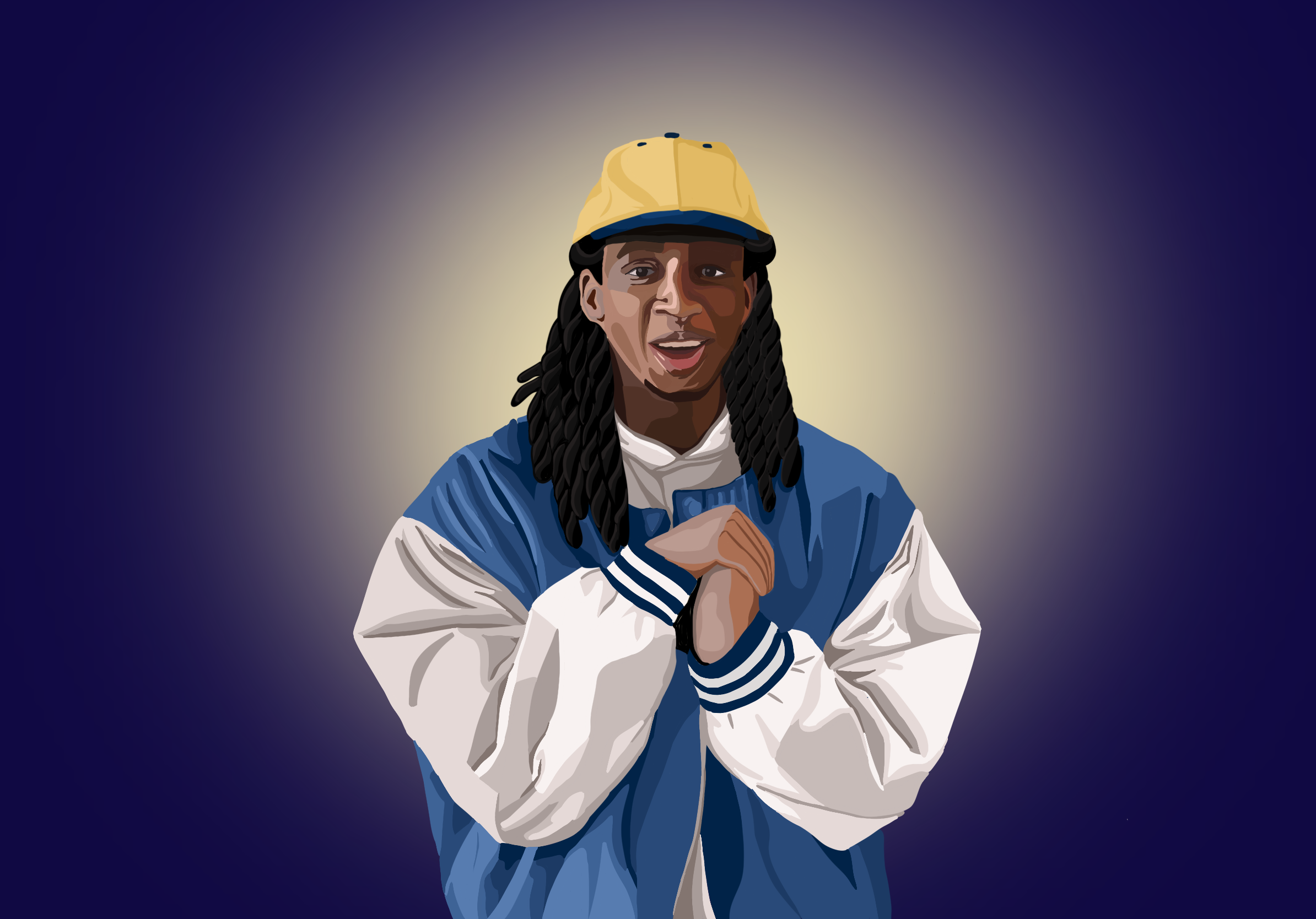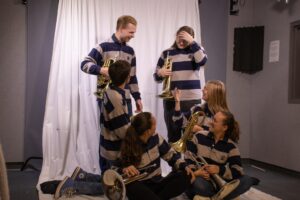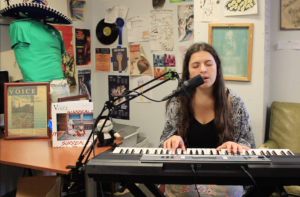“I think society does a very good job of making you feel like there is only five stages to grief, and that’s not the case,” Malachi Quarles (CAS ’23), who releases music under the alias HUGHLANDER, said.
It was out of reckoning with difficult emotions that his latest album, demo nights. (2023), was born. Acknowledging that healing is rarely linear or easy, and neat closure is nearly impossible to achieve, Quarles describes demo nights. as creating his own closure.
Though he is typically a private person, Quarles articulates his experiences with grief after losing his grandfather and a difficult breakup on demo nights., which dropped on March 17. This is the first of three albums Quarles has been working on since his 2021 debut album Dusty Orange—from which demo nights. is a “giant step [up].”
HUGHLANDER allows Quarles the space for public vulnerability. “HUGHLANDER is definitely a place where I get to be my most authentic self and put it out in the world,” Quarles said.
An artist, producer, designer, director, and vocalist from Kentucky, Quarles has become a fixture in Georgetown’s student creative community through his collaboration with other artists. With demo nights.—a predecessor to the upcoming demo days.—Quarles shows that HUGHLANDER is not only an outlet for artistic expression but a community-connected platform for emotional processing.
demo nights. is simultaneously raw—Quarles calls the tracks “sounds that are still in process”—and well-produced, the tracks entrenched in sonic layering. Deep vulnerability is the album’s lyrical and sonic foundation: “The majority of the album, 16 songs, is [about me going] through this grieving process and also learning so much about myself as a man. And also why I love the way I do and why it’s so hard,” Quarles said.
The 17-track album asks listeners to stumble through shock, frustration, sadness, and reflection to reach a kind of closure that accepts that healing doesn’t always sound perfect. Quarles constructs an innovative parallel between the complexity of grief and the music itself—the emotional variety of the grieving process translates into the album’s stylistic and genre variety. demo nights. spans multiple genres, as Quarles deftly switches between sounds like rock, rap, spoken sampling, and indie pop, each sound inflected with a different feeling.
Often these are emotions he doesn’t normally feel comfortable expressing in his day-to-day life. “dakota,” for instance, opens with an angry voicemail from him about his ex, which suddenly cuts out and is replaced by a deep bass and a chaotic mixture of vocal layers with lyrics like, “never got my closure / how my clothes fit you now that you’re settled with a three?”
“‘dakota’ is a very antithetical version of what people see Malachi as,” Quarles said. Indeed, the song’s dark tone even uses profanity Quarles normally avoids.
Despite its personal origins, demo nights. was crafted in community. The record is seeped in collaborations with other Georgetown artists—Kendall Bryant (MSB ’23), Katelyn Barr (SFS ’22), Bella Carlucci (CAS ’23), Amanda Estevez (CAS ’23), and Kian Blewett (SFS ’23), among others, make appearances (the sweetest among them Riley, Quarles’ dog, and her squeaky toy on “GEPPETTO.”) The feature-heavy nature and the album’s timing—released mere months before graduation—makes demo nights. an amalgam of his time on the Hilltop.
“I wanted it to be my last hurrah,” Quarles said. “I’m leaving Georgetown. I wanted it to be making music with all the people I haven’t yet that I’ve met.”
Bringing campus artists together proved an ingenious choice, as demo nights. is impressively multilayered. HUGHLANDER’s style at times seems like a mashup between ’90s grunge and ’90s rap, playing with repetition, echoes, and tempo on songs like “feelings from a fling,” punk guitar riffs on “SCURRED,” and warped rock sounds on “Control” featuring Barr. From the opening track, “aginnn (Warhol’s Theme)” with RASHAAD, Quarles layers guitar and distorted sounds, playing with studio techniques to establish the dynamic tone of the album. “Storm,” featuring KENDALL! (Bryant’s alias), includes a funky bassline, vocal layering, and a light percussive beat creating a groovier sound. In contrast, “ms. understood” interweaves emotional and sonic layers, playing with sound distortion while Estevez’s vocals float above the track, their sounds overlapping, mirroring the relationship Quarles is explaining.
Quarles doesn’t just fit other artists’ contributions into his existing sound; he fosters a space for himself and his peers to create at a university that he feels doesn’t support them. “Georgetown as, like, an institution—it’s hard to make music,” Quarles said. “There’s not a really collective ‘I want to be a musician,’ or ‘I am a musician.’”
Grappling with this landscape has been key to Quarles’ growth as an artist and person; in December 2022, he hosted a concert entitled “HUGH’S ROOM” to make Georgetown’s student musicians more visible, specifically those of color.
“The whole lineup was people of color and I don’t think I did that intentionally, but that was super cool,” Quarles said. “I wanted to have a concert to say that I did that on Georgetown’s campus, and make it something that was more than just us in McNeir Hall.”
The revelation of oft-hidden layers that HUGHLANDER provides is Quarles’ benediction. Quarles excels in vulnerability on the album, as best demonstrated on tracks like “annette*” and “solo” featuring Kian. The former includes gentle piano accompanied by brutally honest lines such as “I can’t look at you and not love, not love you.”
But despite the frustration and heartache of the album, there’s a sweetness to its resolution. The album closes with “an ode to papa,” dedicated to Quarles’ grandfather. It is meditative and bright, with a repeated motif expressing the cyclical nature of processing loss. “an ode to papa” resolves the album but as a stunning instrumental track, sonically leaves the space for grief to return, as it always does—something that almost sounds like closure.
When journeying through demo nights., Quarles hopes listeners approach the work with open ears, embracing it as a journey of self-discovery.
“Go into it like you aren’t listening to an album by Malachi,” he said. “Just experience a person learning who they are.”
VOICE’S CHOICES: dakota, annette*, Storm




